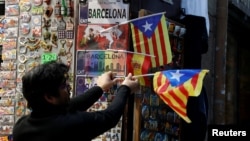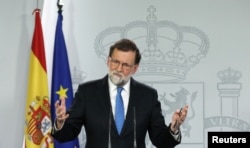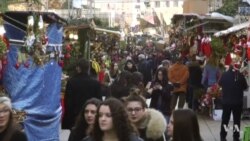Spain’s prime minister has rejected demands for talks from Catalonia’s independence leaders, following regional elections in the semi-autonomous region Thursday which gave pro-secessionist parties a slim majority of two seats in the Catalan parliament.
The election was called after Madrid sacked the Catalan government, after it tried to declare independence following a disputed referendum in October.
The former Catalan President Carles Puigdemont, who is in exile in Belgium, called for talks Friday with Spanish Prime Minister Mariano Rajoy in a location outside Spain.
“Catalonia wants to be an independent state. This is the wish of the Catalan people,” Puigdemont told reporters in Brussels.
Puigdemont would face arrest if he tried to return to Spain. Many independence leaders have been jailed on charges of sedition, rebellion and misuses of public funds. The investigation was widened Friday to include several more Catalan politicians.
Rajoy said the election result does not affect the criminal charges.
“I hope there is a government that abandons unilateral decision-making and does not place itself above the law,” he told reporters in Madrid. He added that his first point of contact would be with the leader of the pro-unity Ciudadanos’ or Citizens party, which won the most votes, though short of the number needed to form a government.
Back where they started
After the political convulsions of the past three months, Catalonia and Spain are back to square one, said Xabier Barrena, a political columnist for the El Periodico newspaper.
“Catalonia is living in an infinite stalemate. There was a considerable increase in participation in the parliamentary elections this time, and despite this, the result is the same as in 2015. Both then, and now, the solution must be a legitimate referendum,” he said.
The most likely election outcome remains a coalition of the three pro-independence parties, but their options appear limited, Barrena said.
“Any unilateral declaration (of independence) would elicit a violent response from the state,” he said. “So, they will avoid that course.”
WATCH: Spanish PM Rebuffs Catalan Leaders' Demand for Talks on Independence Following Election
Economic uncertainty
Meanwhile fears are growing that the uncertainty is hitting Catalonia’s economy. Carlos Rivaduro, head of Catalonia’s Association of Small Business, says the global image of Barcelona and Catalonia is taking a hit.
“Who wants to do business in a place where politicians are promoting division, exclusion, lack of solidarity?” he said.
The political tensions are given extra spice as the Barcelona football team travels to play Real Madrid Saturday. For many, the sporting rivalry trumps politics.
The Christmas break offers a few days respite before the political battle kicks off once again.








